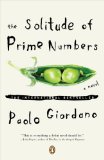Summary | Excerpt | Reading Guide | Reviews | Beyond the Book | Readalikes | Genres & Themes | Author Bio

A Novel
by Paolo Giordano1
Alice Della Rocca hated ski school. She hated getting up at seven-thirty, even during Christmas vacation. She hated her father staring at her over breakfast, his leg dancing nervously under the table as if to say hurry up, get a move on. She hated the woolen tights that made her thighs itch, the mittens that kept her from moving her fingers, the helmet that squashed her cheeks, and the big, too tight boots that made her walk like a gorilla.
“Are you going to drink that milk or not?” her father insisted again.
Alice gulped down three inches of boiling milk, burning her tongue, throat, and stomach.
“Good, today you can show us what you’re really made of.”
What’s that? Alice wondered.
He shoved her out the door, mummified in a green ski suit dotted with badges and the fluorescent logos of the sponsors. It was 14 degrees and a gray fog enveloped everything. Alice felt the milk swirling around in her stomach as she sank into the snow. Her skis were over her shoulder, because you had to carry your skis yourself until you got good enough for someone to carry them for you.
“Keep the tips facing forward or you’ll kill someone,” her father said.
At the end of the season the Ski Club gave you a pin with little stars on it. A star a year, from when you were four years old and just tall enough to slip the little disk of the ski lift between your legs until you were nine and you managed to grab the disk all by yourself. Three silver stars and then another three in gold: a pin a year, a way of saying you’d gotten a little better, a little closer to the races that terrified Alice. She was already worried about them even though she had only three stars.
They were to meet at the ski lift at eight-thirty sharp, right when it opened. The other kids were already there, standing like little soldiers in a loose circle, bundled up in their uniforms, numb with sleep and cold. They planted their ski poles in the snow and wedged the grips in their armpits. With their arms dangling, they looked like scarecrows. No one felt like talking, least of all Alice. Her father rapped twice on her helmet, too hard, as if trying to pound her into the snow.
“Pull out all the stops,” he said. “And remember: keep your body weight forward, okay? Body weight forward.”
“Body weight forward,” echoed the voice in Alice’s head.
Then he walked away, blowing into his cupped hands. He’d soon be home again, reading the paper in the warmth of their house. Two steps and the fog swallowed him up.
Alice clumsily dropped her skis on the ground and banged her boots with a ski pole to knock off the clumps of snow. If her father had seen her he would have slapped her right there, in front of everyone.
She was already desperate for a pee; it pushed against her bladder like a pin piercing her belly. She wasn’t going to make it today either. Every morning it was the same. After breakfast she would lock herself in the bathroom and push and push, trying to get rid of every last drop, contracting her abdominal muscles till her head ached and her eyes felt like they were going to pop out of their sockets. She would turn the tap full blast so that her father wouldn’t hear the noises as she pushed and pushed, clenching her fists, to squeeze out the very last drop. She would sit there until her father pounded on the door and yelled so, missy, are we going to be late again today?
But it never did any good. By the time they reached the top of the first ski lift she would be so desperate that she would have to crouch down in the fresh snow and pretend to tighten her boots in order to take a pee inside her ski suit while all her classmates looked on, and Eric, the ski instructor, would say we’re waiting for Alice, as usual. It’s such a relief, she thought each time, as the lovely warmth trickled between her shivering legs. Or it would be, if only they weren’t all there watching me.
Reprinted by arrangement with Pamela Dorman Books/Viking, a member of Penguin Group (USA) Inc., from The Solitude of Prime Numbers by Paolo Giordano. Translation copyright (c) Shaun Whiteside, 2009., Copyright (c) 2008 Arnoldo Mondadori Editore S.p.A.
Anagrams
Click Here to find out who said this, as well as discovering other famous literary quotes!
Your guide toexceptional books
BookBrowse seeks out and recommends the best in contemporary fiction and nonfiction—books that not only engage and entertain but also deepen our understanding of ourselves and the world around us.